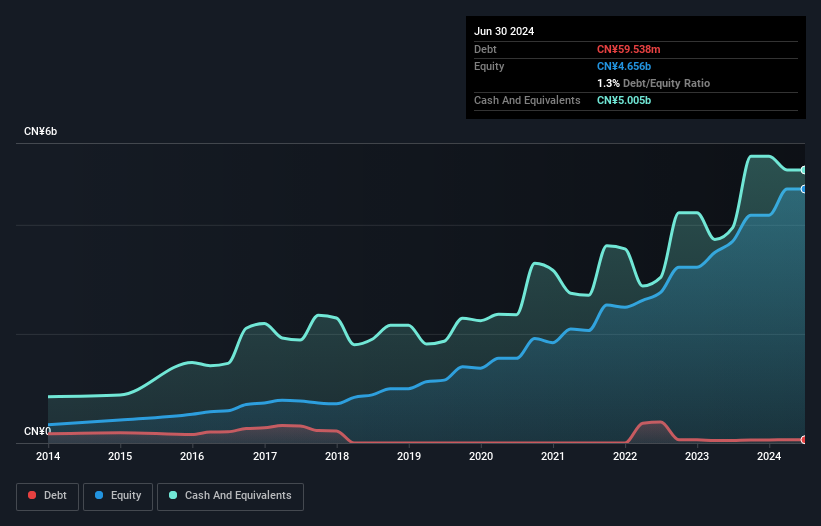
Some say volatility, rather than debt, is the best way to think about risk as an investor, but Warren Buffett famously said that 'Volatility is far from synonymous with risk.' When we think about how risky a company is, we always like to look at its use of debt, since debt overload can lead to ruin. Importantly, China Overseas Property Holdings Limited (HKG:2669) does carry debt. But is this debt a concern to shareholders?
When Is Debt Dangerous?
Debt assists a business until the business has trouble paying it off, either with new capital or with free cash flow. Ultimately, if the company can't fulfill its legal obligations to repay debt, shareholders could walk away with nothing. However, a more common (but still painful) scenario is that it has to raise new equity capital at a low price, thus permanently diluting shareholders. Of course, plenty of companies use debt to fund growth, without any negative consequences. When we examine debt levels, we first consider both cash and debt levels, together.
Check out our latest analysis for China Overseas Property Holdings
What Is China Overseas Property Holdings's Debt?
As you can see below, at the end of June 2024, China Overseas Property Holdings had CN¥59.5m of debt, up from CN¥47.8m a year ago. Click the image for more detail. But on the other hand it also has CN¥5.01b in cash, leading to a CN¥4.95b net cash position.

How Healthy Is China Overseas Property Holdings' Balance Sheet?
The latest balance sheet data shows that China Overseas Property Holdings had liabilities of CN¥6.72b due within a year, and liabilities of CN¥96.9m falling due after that. On the other hand, it had cash of CN¥5.01b and CN¥3.98b worth of receivables due within a year. So it actually has CN¥2.17b more liquid assets than total liabilities.
This surplus suggests that China Overseas Property Holdings is using debt in a way that is appears to be both safe and conservative. Because it has plenty of assets, it is unlikely to have trouble with its lenders. Succinctly put, China Overseas Property Holdings boasts net cash, so it's fair to say it does not have a heavy debt load!
Fortunately, China Overseas Property Holdings grew its EBIT by 4.7% in the last year, making that debt load look even more manageable. When analysing debt levels, the balance sheet is the obvious place to start. But ultimately the future profitability of the business will decide if China Overseas Property Holdings can strengthen its balance sheet over time. So if you want to see what the professionals think, you might find this free report on analyst profit forecasts to be interesting.
Finally, a company can only pay off debt with cold hard cash, not accounting profits. China Overseas Property Holdings may have net cash on the balance sheet, but it is still interesting to look at how well the business converts its earnings before interest and tax (EBIT) to free cash flow, because that will influence both its need for, and its capacity to manage debt. Over the most recent three years, China Overseas Property Holdings recorded free cash flow worth 67% of its EBIT, which is around normal, given free cash flow excludes interest and tax. This cold hard cash means it can reduce its debt when it wants to.
Summing Up
While we empathize with investors who find debt concerning, you should keep in mind that China Overseas Property Holdings has net cash of CN¥4.95b, as well as more liquid assets than liabilities. The cherry on top was that in converted 67% of that EBIT to free cash flow, bringing in CN¥1.4b. So is China Overseas Property Holdings's debt a risk? It doesn't seem so to us. When analysing debt levels, the balance sheet is the obvious place to start. However, not all investment risk resides within the balance sheet - far from it. To that end, you should be aware of the 1 warning sign we've spotted with China Overseas Property Holdings .
Of course, if you're the type of investor who prefers buying stocks without the burden of debt, then don't hesitate to discover our exclusive list of net cash growth stocks, today.
Have feedback on this article? Concerned about the content? Get in touch with us directly. Alternatively, email editorial-team (at) simplywallst.com.
This article by Simply Wall St is general in nature. We provide commentary based on historical data and analyst forecasts only using an unbiased methodology and our articles are not intended to be financial advice. It does not constitute a recommendation to buy or sell any stock, and does not take account of your objectives, or your financial situation. We aim to bring you long-term focused analysis driven by fundamental data. Note that our analysis may not factor in the latest price-sensitive company announcements or qualitative material. Simply Wall St has no position in any stocks mentioned.